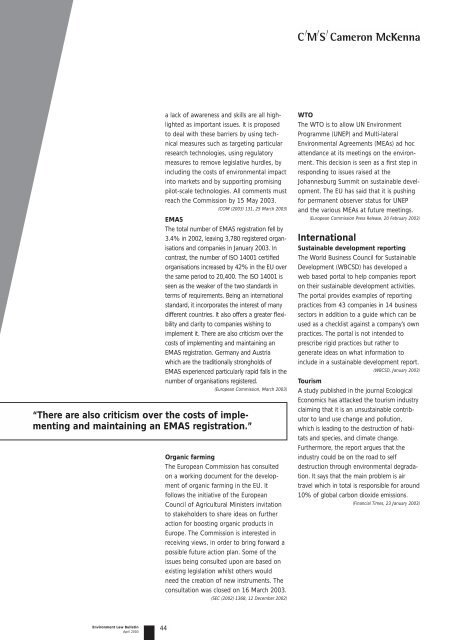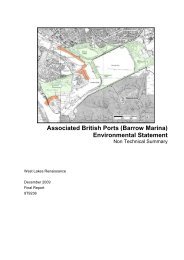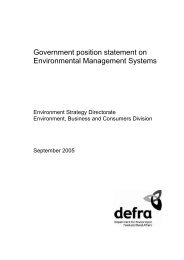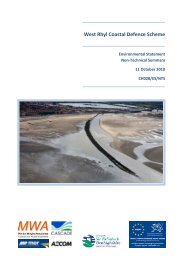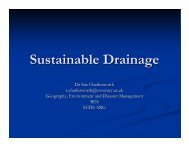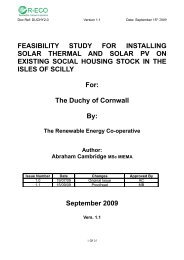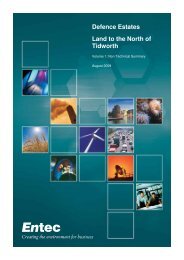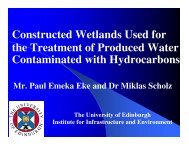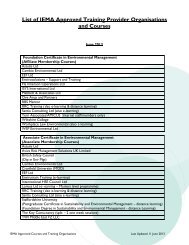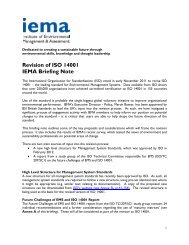Environment Law Bulletin - Institute of Environmental Management ...
Environment Law Bulletin - Institute of Environmental Management ...
Environment Law Bulletin - Institute of Environmental Management ...
You also want an ePaper? Increase the reach of your titles
YUMPU automatically turns print PDFs into web optimized ePapers that Google loves.
a lack <strong>of</strong> awareness and skills are all highlightedas important issues. It is proposedto deal with these barriers by using technicalmeasures such as targeting particularresearch technologies, using regulatorymeasures to remove legislative hurdles, byincluding the costs <strong>of</strong> environmental impactinto markets and by supporting promisingpilot-scale technologies. All comments mustreach the Commission by 15 May 2003.(COM (2003) 131, 25 March 2003)EMASThe total number <strong>of</strong> EMAS registration fell by3.4% in 2002, leaving 3,780 registered organisationsand companies in January 2003. Incontrast, the number <strong>of</strong> ISO 14001 certifiedorganisations increased by 42% in the EU overthe same period to 20,400. The ISO 14001 isseen as the weaker <strong>of</strong> the two standards interms <strong>of</strong> requirements. Being an internationalstandard, it incorporates the interest <strong>of</strong> manydifferent countries. It also <strong>of</strong>fers a greater flexibilityand clarity to companies wishing toimplement it. There are also criticism over thecosts <strong>of</strong> implementing and maintaining anEMAS registration. Germany and Austriawhich are the traditionally strongholds <strong>of</strong>EMAS experienced particularly rapid falls in thenumber <strong>of</strong> organisations registered.(European Commission, March 2003)“There are also criticism over the costs <strong>of</strong> implementingand maintaining an EMAS registration.”Organic farmingThe European Commission has consultedon a working document for the development<strong>of</strong> organic farming in the EU. Itfollows the initiative <strong>of</strong> the EuropeanCouncil <strong>of</strong> Agricultural Ministers invitationto stakeholders to share ideas on furtheraction for boosting organic products inEurope. The Commission is interested inreceiving views, in order to bring forward apossible future action plan. Some <strong>of</strong> theissues being consulted upon are based onexisting legislation whilst others wouldneed the creation <strong>of</strong> new instruments. Theconsultation was closed on 16 March 2003.(SEC (2002) 1368, 12 December 2002)WTOThe WTO is to allow UN <strong>Environment</strong>Programme (UNEP) and Multi-lateral<strong>Environment</strong>al Agreements (MEAs) ad hocattendance at its meetings on the environment.This decision is seen as a first step inresponding to issues raised at theJohannesburg Summit on sustainable development.The EU has said that it is pushingfor permanent observer status for UNEPand the various MEAs at future meetings.(European Commission Press Release, 20 February 2003)InternationalSustainable development reportingThe World Business Council for SustainableDevelopment (WBCSD) has developed aweb based portal to help companies reporton their sustainable development activities.The portal provides examples <strong>of</strong> reportingpractices from 43 companies in 14 businesssectors in addition to a guide which can beused as a checklist against a company’s ownpractices. The portal is not intended toprescribe rigid practices but rather togenerate ideas on what information toinclude in a sustainable development report.(WBCSD, January 2003)TourismA study published in the journal EcologicalEconomics has attacked the tourism industryclaiming that it is an unsustainable contributorto land use change and pollution,which is leading to the destruction <strong>of</strong> habitatsand species, and climate change.Furthermore, the report argues that theindustry could be on the road to selfdestruction through environmental degradation.It says that the main problem is airtravel which in total is responsible for around10% <strong>of</strong> global carbon dioxide emissions.(Financial Times, 23 January 2003)<strong>Environment</strong> <strong>Law</strong> <strong>Bulletin</strong>April 200344


